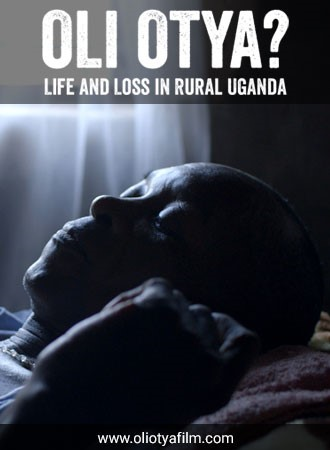
Oli Otya? Life and Loss in Rural Uganda 2020
Distributed by Alexander Street Press, 350 7th Ave/Ste 1100, New York, NY 10001
Produced by Lucy Bruell and Jack Briggs
Directed by Lucy Bruell
Streaming, 77 mins
General Adult
Global Health; Nursing; Palliative Care
Date Entered: 04/08/2021
Reviewed by Karen Yacobucci, Head, Content Management & Library Outreach Strategist, NYU Langone HealthIn rural Uganda, nurses from the St. Francis Naggalama hospital travel into nearby villages to provide palliative care to people with life-threatening illnesses, with the intention of alleviating symptoms as well as providing patients relief from pain. Each year a small group of American physicians volunteer to travel into the villages with the nurses. Oli Otya? Life and Loss in Rural Uganda is a documentary film which follows this palliative care team as they meet with patients.
Oli Otya provides a real-life glimpse into the unique challenges surrounding global healthcare in the modern world. In a location where inaccessibility to healthcare is pervasive, medical professionals are faced with a lack of access to modern technologies and testing that would otherwise be available in larger, wealthier countries and communities. These medical professionals often need to make do with what tools are available to them, while enlisting creative application of medicines and techniques to provide much needed relief for patients.
The palliative care team in Oli Otya shares with viewers what the practice of medicine in its purest form looks like, a practice rooted in compassion and humanity. It is because of this that one of the doctors comments in this film, that the work that they do touches the “essence of medicine.”
In beautifully candid moments captured by the filmmakers, the care team describes the work they are doing as being life-altering and even unexpected in many ways. Moments of sadness are juxtaposed by moments of joy; a mother dying of cancer, wondering how her children will be cared for after she is gone, a burn victim who refuses to give up, the triumph of a young girl learning to walk again, and so many more. Oli Otya provides just as much attention to the lives of its patients as it does the care team, allowing the viewer to share in their most intimate moments.
The American physicians in Oli Otya are all too aware of their role as guests of Uganda, and their desire is to be viewed as partners in healthcare. The physicians talk about feeling isolated behind language and cultural barriers, and how to better adapt their western healthcare training, which may not always be applicable to certain cultural settings.
The film touches on cultural hesitancy towards modern medicine delivered in hospitals. Due to this hesitancy, many patients that are seen by the care team for the first time are already in the advanced stages of disease. Issues surrounding this reluctance to healthcare in hospitals is discussed and includes cultural fears of hospitals, financial barriers faced by patients, and in some cases the belief that the root cause of disease is the result of witchcraft or demonic possession.
Many patients refer to traditional healers first who are prevalent in the area, which can include local Herbalists and Bone Setters. This pathway is often more financially feasible for patients and can provide some results but can be a barrier to patients receiving much needed intervention for deadlier, more time-sensitive diseases like Cancer and HIV/AIDS.
Overall, Oli Otya is a story of humanity. Regardless of faith or culture, the lives shared in Oli Otya emphasize a global partnership in care that is transcendent of circumstance, where relief from pain and medical care should never be a privilege, but a human right.
Awards:
Official Selection, Sedona International Film Festival; Exceptional Merit Award, Docs Without Borders 2020; Award of Excellence: Original Score, Docs Without Borders 2020; Award of Excellence: Health/Medicine/Science Impact, Docs Without Borders 2020; Award of Excellence: Original Score by Samite Impact, Doc Awards 2020; Official Selection, 2021 African Film Festival (Taff).
Published and licensed under the Creative Commons Attribution 4.0 license. Anyone can use these reviews, so long as they comply with the terms of the license.